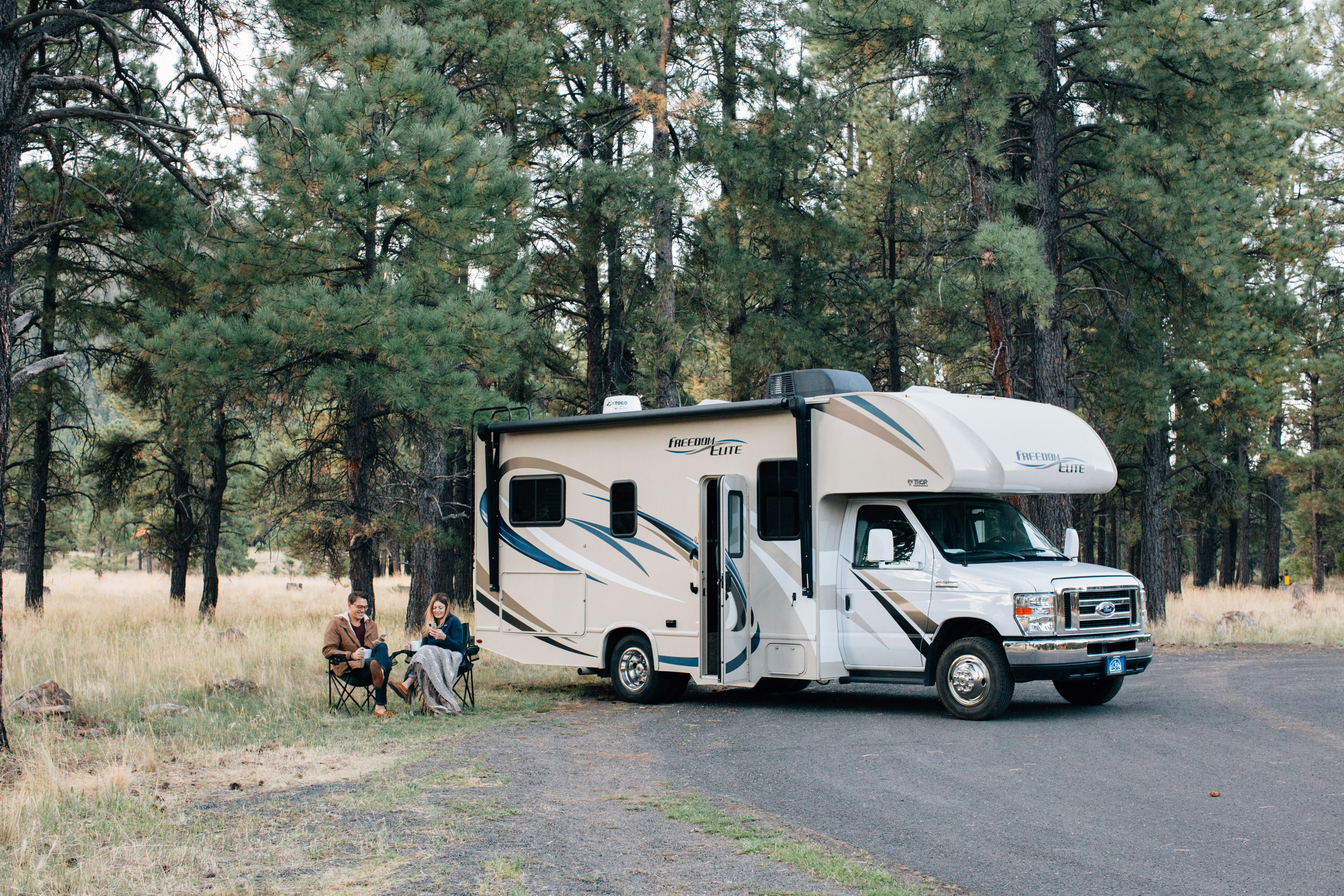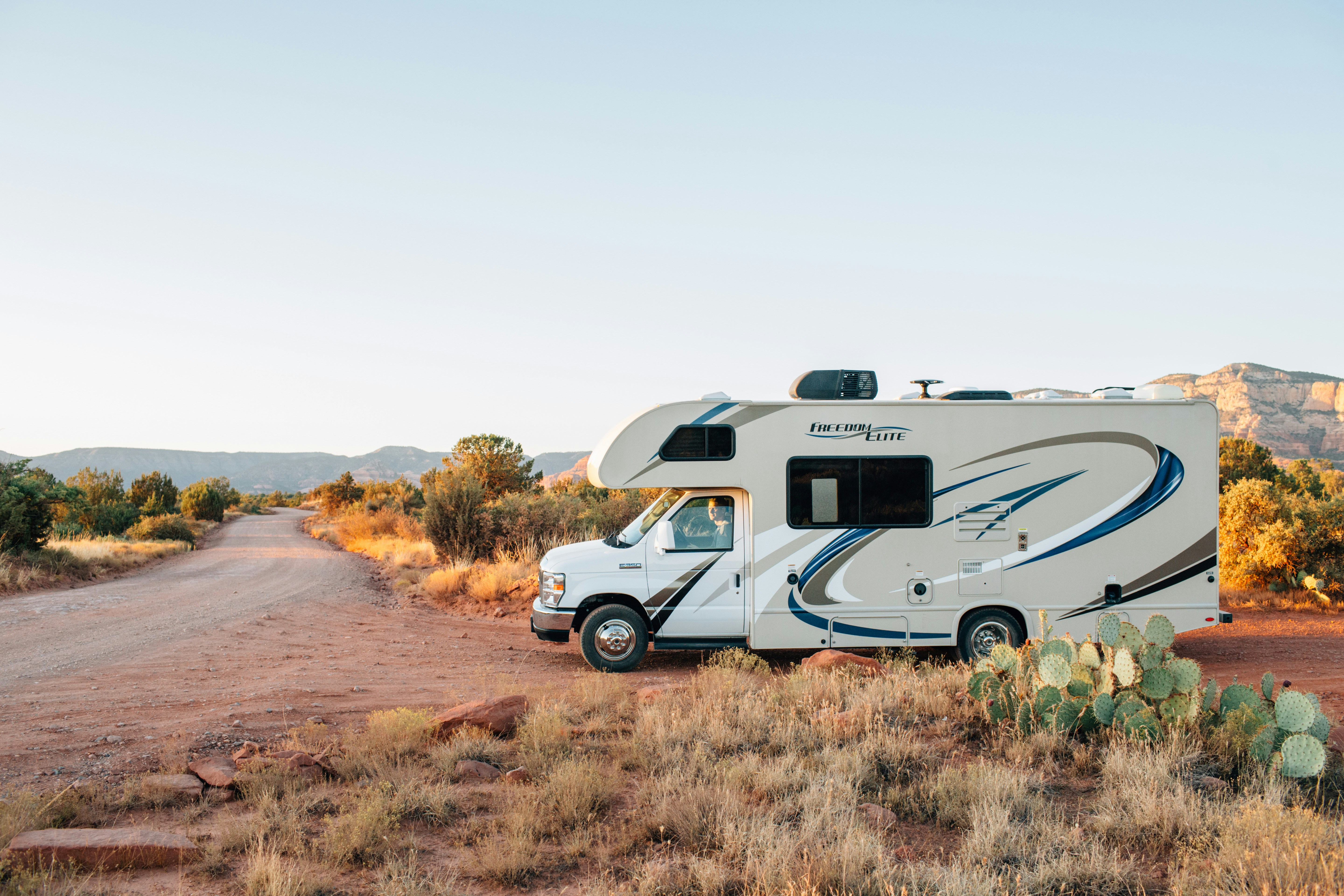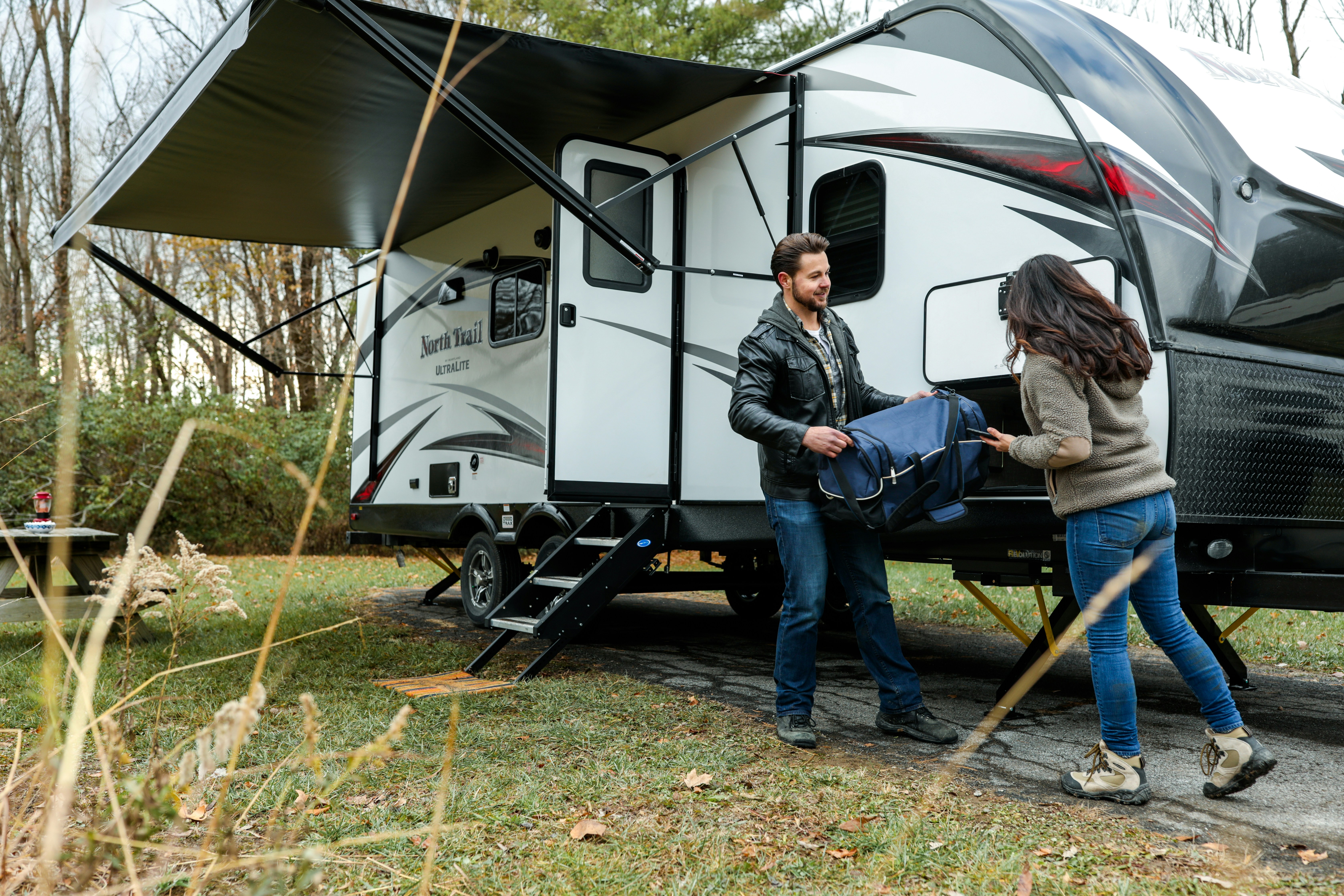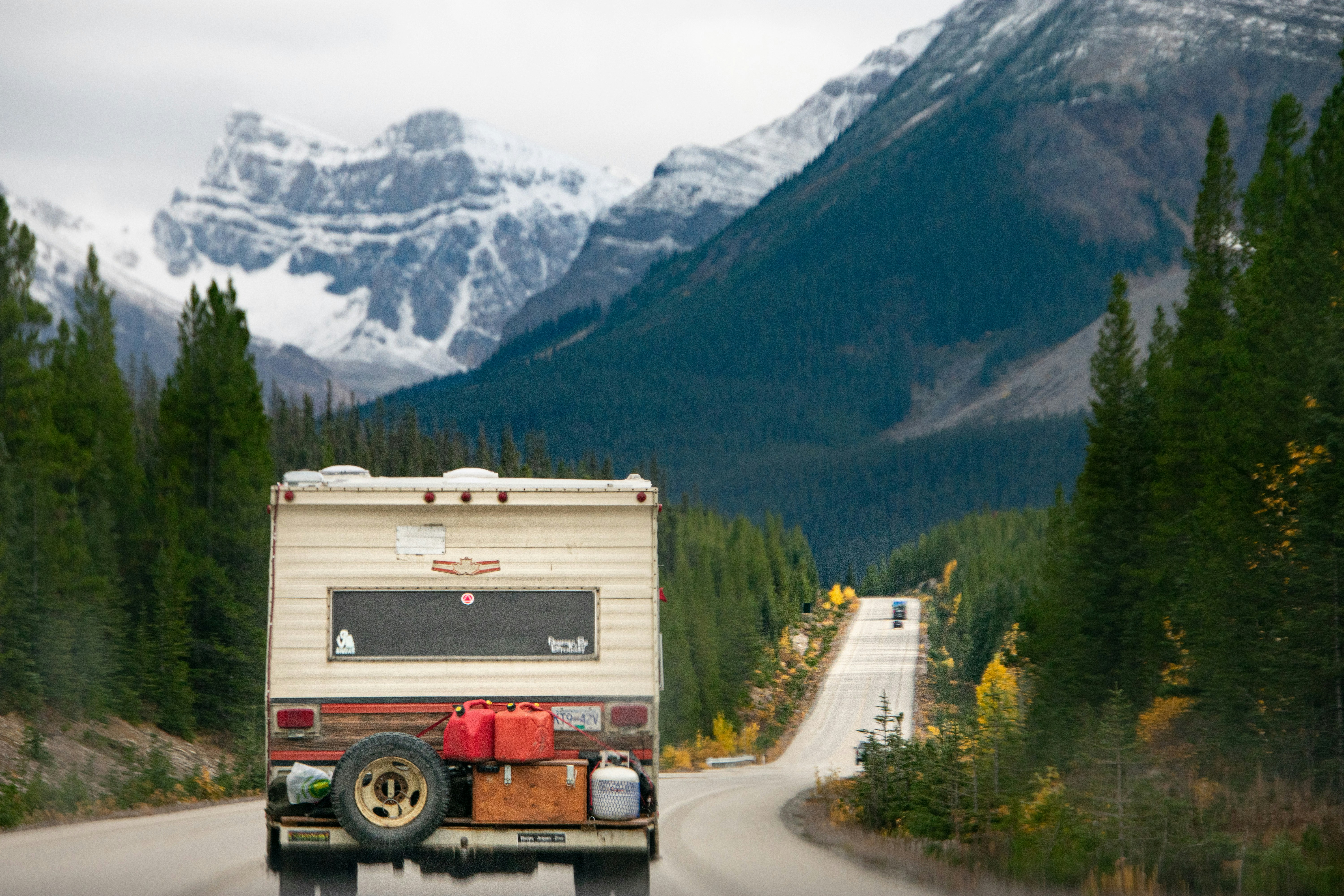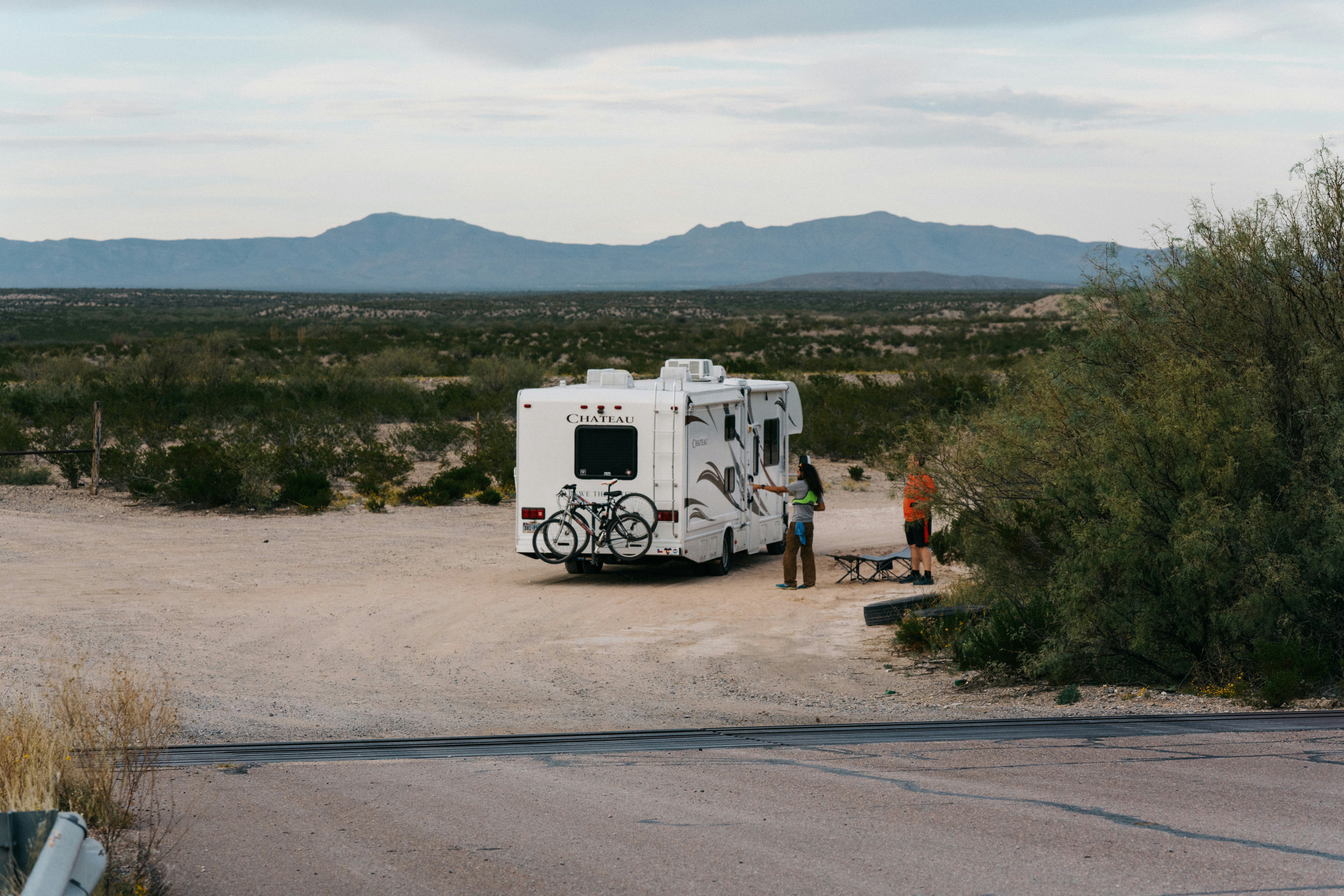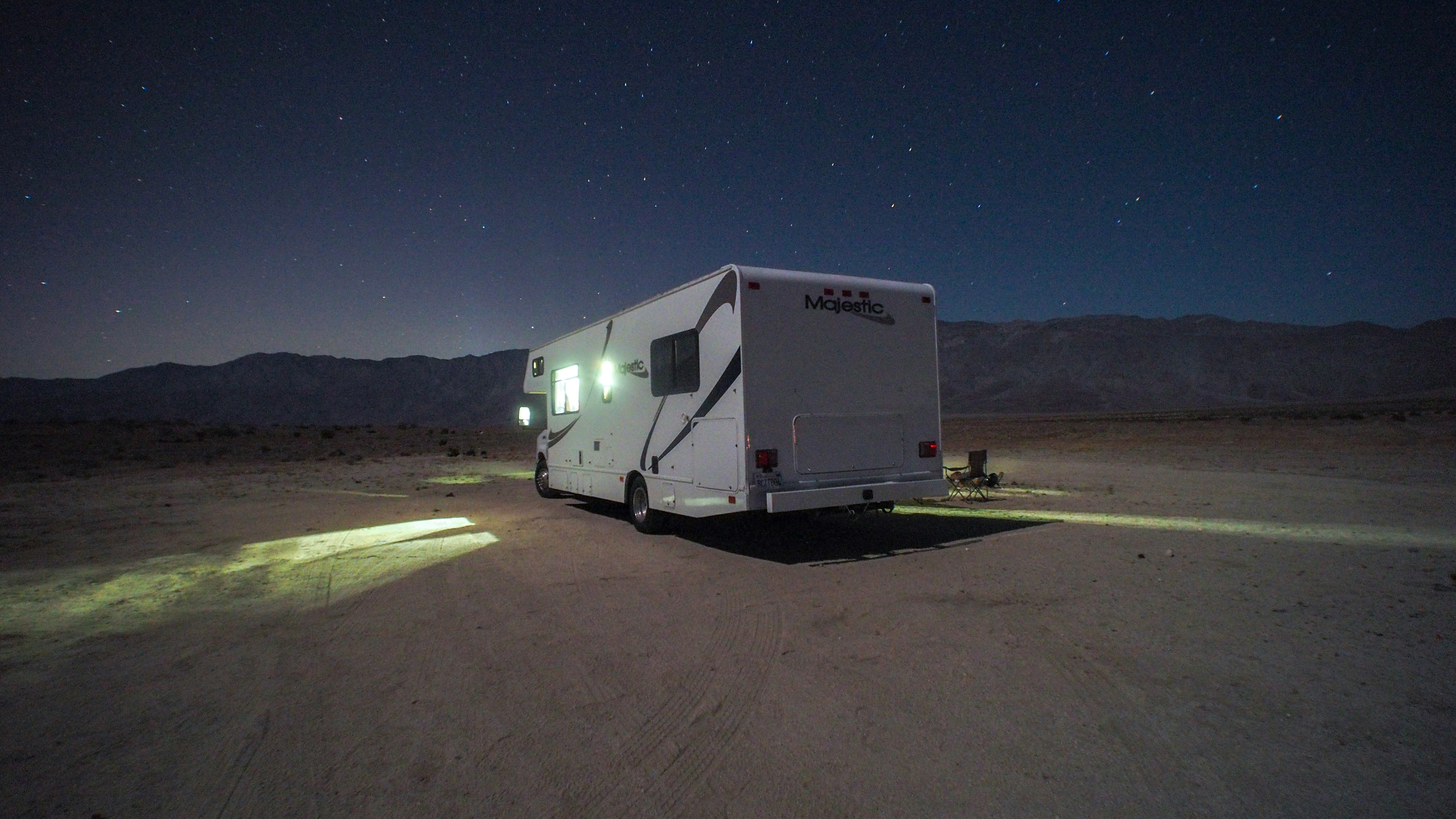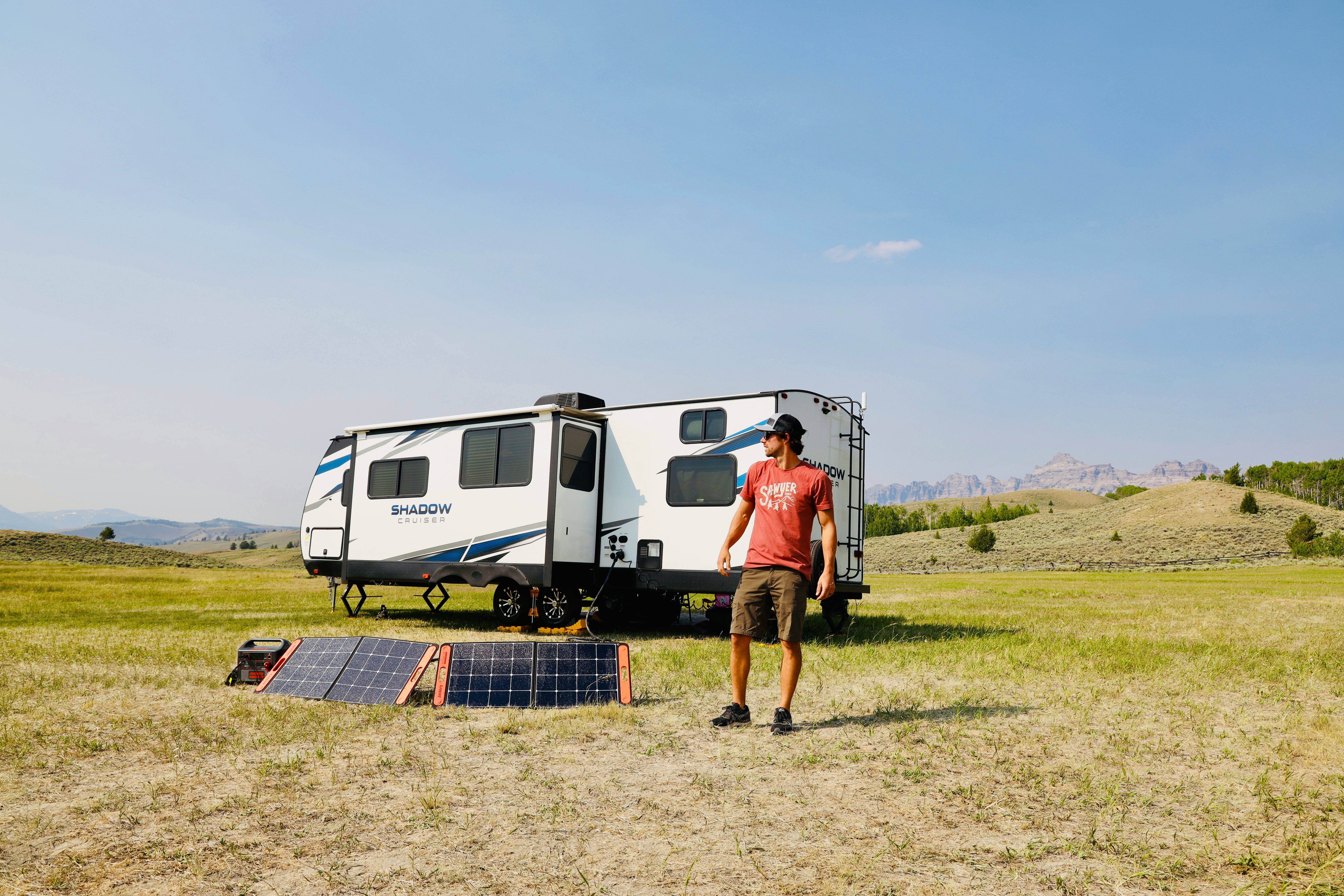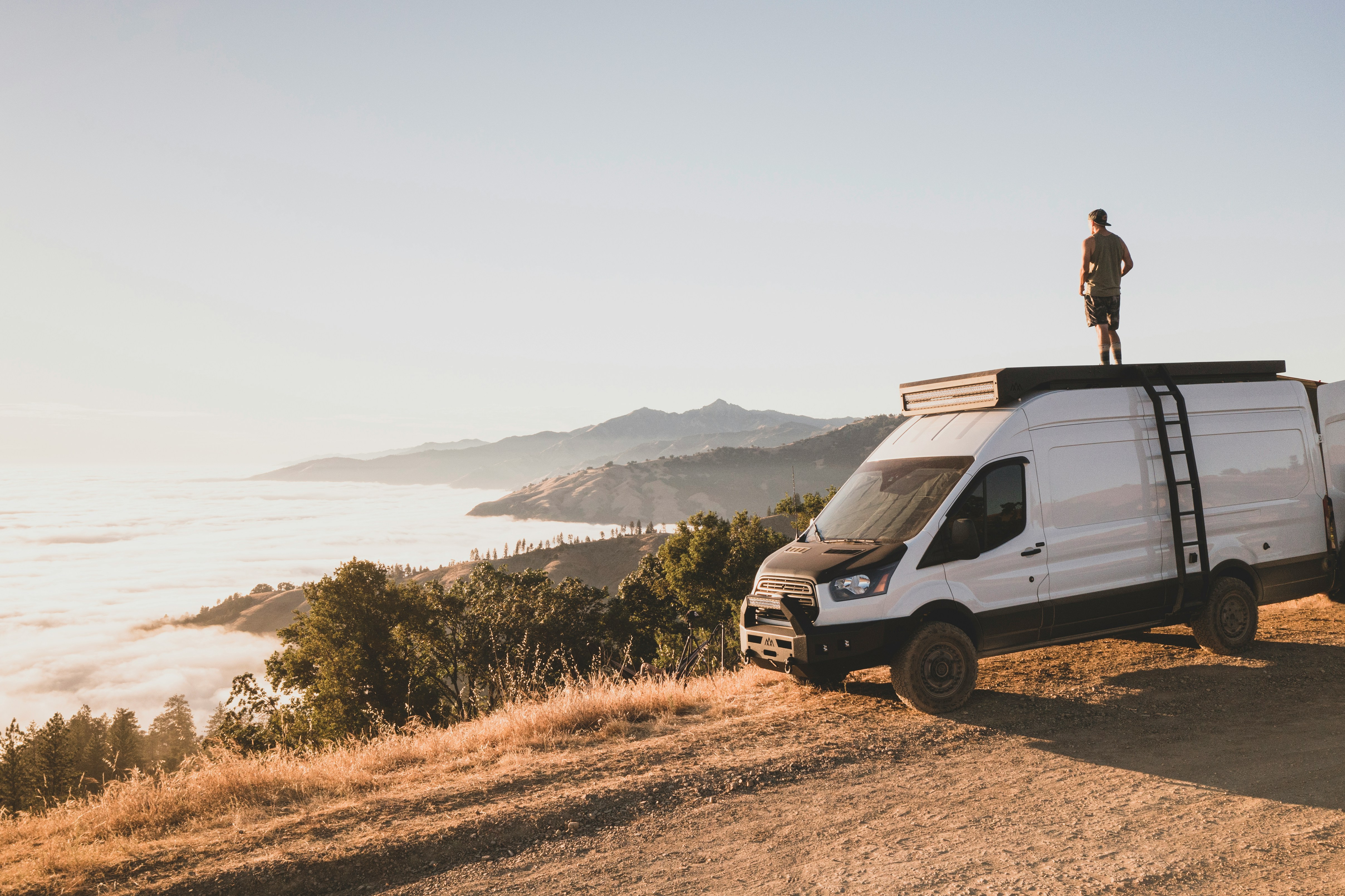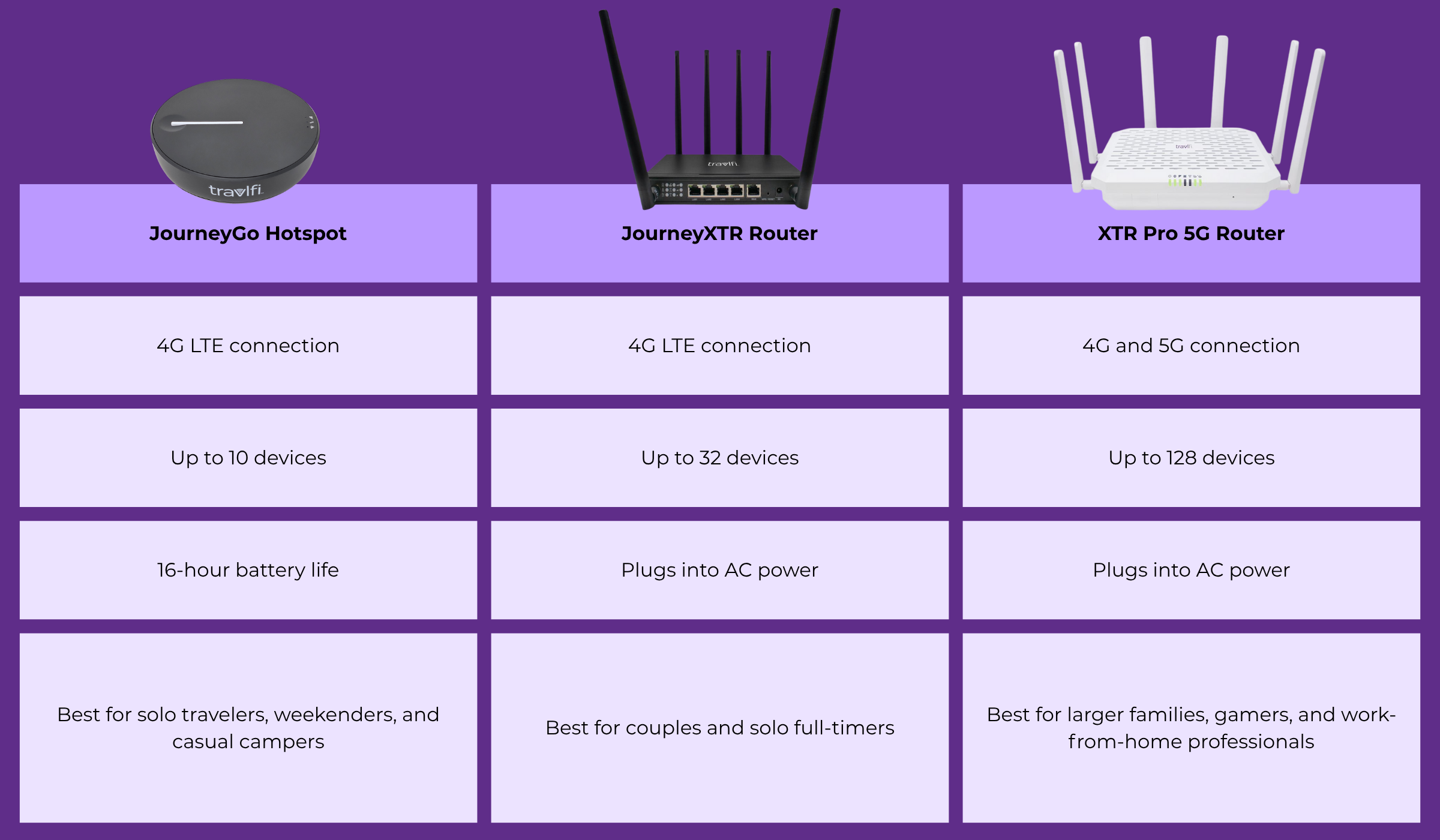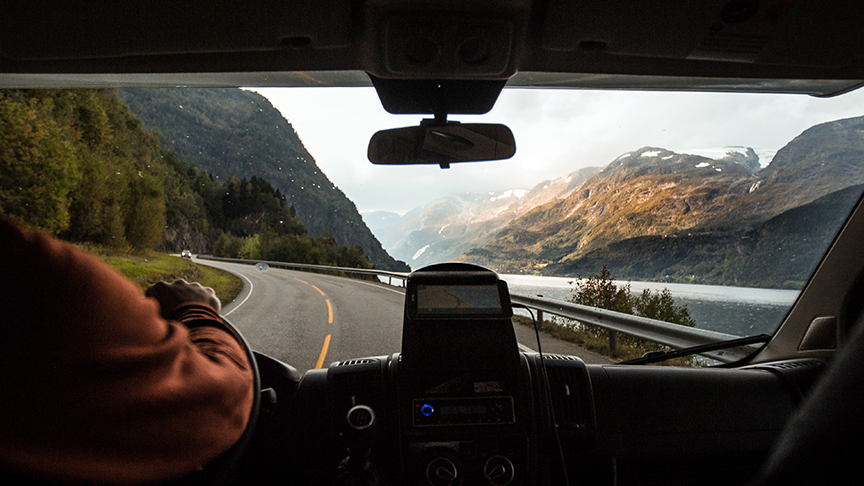
These rookie RV mistakes can derail your road trip if you let them. Our experts share how to avoid them for a smooth vacation.
There’s a lot to love about RV life: the freedom of life on the road, the thrill of discovering your new favorite campground, and the peace of having your home with you wherever you chose to go. But if you’re new to RVing, those first few trips can feel less like a laid-back getaway and more like a stressful learning curve on wheels. That’s because RV travel—while rewarding—requires a bit of prep, planning, and practice. So, before you head out on your first RV adventure, it pays to know the rookie mistakes to avoid.
RV industry spokesperson Monika Geraci keeps it pretty straightforward for newbies: “Take your time, do your research, [and] ask questions.” From overpacking your rig to relying on campground WiFi instead of RV WiFi, we’ve asked the questions for you and rounded up the most common travel mistakes first-time RVers make—plus, how to sidestep them.
Experts Who Contributed to This Article
The following experts contributed expertise about common RV mistakes and how to avoid them:
- Monika Geraci, industry spokesperson for GoRVing
- Maddi Bourgerie, travel expert at RVShare
- Jen Schoenfeld, full-time traveler and travel blogger
- Bruce Leadbetter, founder at 360 Adventures
Amanda Capritto, TravlSync editor and full-time vanlifer, reviewed this article for accuracy. Lauren Keary, the author of this piece, is an experienced traveler and travel journalist.
More Like This:
- RV vs. Camper Trailer: Compare Maintenance, Costs, Pros, Cons, and More
- How Far Will 200 GB of Mobile Data Go? (Usage Guide for RVers and Remote Workers)
- TravlFi vs Starlink for RV Internet: Cost, Coverage & Speed—Which Fits Your Adventure?
Top RV Mistakes That New Owners Make
Choosing the Wrong Rig
“First-time RVers should prioritize how they plan to use the RV. The key is to choose one that truly fits your lifestyle needs and travel goals,” says RV industry spokesperson Monika Geraci.
Ask yourself: Are you towing or driving? Planning remote site stops or full-hookup campgrounds? Bringing the whole family or just a dog and a duffel bag? There’s no one-size-fits-all rig. Geraci recommends using resources like Go RVing’s Right RV for You Quiz to narrow down the best fit.
She adds that some RVers mistakenly shop based on size alone, thinking bigger is always better. But large rigs often come with more challenges, like tight turns, fuel consumption, and limited campground access. There are ample options when it comes to camper vans—focus on layout and how well the space suits your daily needs instead of opting for the biggest rig you can find within budget.
Related: Types of Campers Vans to Know About Before Starting Your Vanlife Journey
Buying Without an Inspection
We’re all for reducing, reusing, and recycling, and that includes buying used rigs. But if that’s the route you take, you must make it a priority to have a thorough, professional inspection of the rig before handing over your cash (and maybe getting a second opinion, depending on the condition and age of the build).
“I made the mistake of buying a used trailer without an inspection, which led to several expensive surprises on day one,” says Bruce Leadbetter, founder of 360 Adventures. “If I could give one piece of advice to new RV owners, hire a certified RV tech for a pre-purchase inspection and always budget for tires, brakes, seals and the roof, plus labor.”
Overbuying on Features You Don’t Need
Yes, the fancy extras like wine fridges and touchscreen panels are tempting, but Geraci reminds us: “Every RVer has different needs and different preferences so it’s impossible to state one RV feature that is unnecessary across the board.”
Before buying, make a list of must-haves versus nice-to-haves. For example, outdoor TVs may seem fun, but if you’re spending most of your days hiking and exploring then crashing as soon as you get back to camp, will that outdoor TV really be a prominent part of your day-to-day?
A washer/dryer might be helpful for full-timers but excessive for weekend warriors. We recommend you always go small first to see what features matter most in real-world use.
Hitting the Road Without a Pre-Trip Safety Check
“Before you hit the road, a quick pre-trip safety check can make all the difference in helping your RV adventure go smoothly,” says Geraci. Her must-do list includes walking the perimeter for obstacles, checking tire pressure, testing lights, confirming backup cameras and mirrors are working, and securing all gear inside and out.
Don’t forget to check your hitch connections if you’re towing and ensure that slide-outs, steps, and stabilizers are retracted. These simple steps can prevent costly damage and keep you and others safe on the road.
Related: How to Stay Safe in an RV: Advice for RV Living, Vanlife, and Boondocking
Traveling Before Knowing Your Rig
Geraci strongly advises understanding your RV’s core systems—electric, water, and propane—and practicing hook-ups before your trip. “Try connecting to power, water, and sewer at home or a local campground, so you’re not troubleshooting on the go,” she says.
Spend time reading your owner’s manual, watching tutorials for your specific model, and practicing with systems like your awning, generator, and leveling jacks. Confidence in your set-up will save you hours of frustration later after a long day of driving.
Exceeding the Vehicle Weight Rating
“It is always important to follow the guidelines in your owner’s manual to ensure safety for you, your travel companions, and your RV,” Geraci says. Overloading your RV can strain your brakes, tires, and suspension, not to mention void your warranty. Use a weigh station before your trip to confirm you're in the clear.
Don’t forget to factor in water weight and gear when calculating your load. Tools like a CAT scale or mobile RV weighing service can help ensure your set-up is safe.
Skipping Maintenance
Sterilizing your water tank might not be the sexiest task, but Geraci warns that it’s essential. “Sterilizing your water tank is an essential maintenance task that can cause big headaches (figuratively and literally) if skipped.” She recommends making a checklist to stay on top of upkeep.
You’ll also want to make sure to seal your roof annually, clean your AC filters, and check your battery health. These simple preventive maintenance tasks reduce the risk of costly repairs en-route.
Underestimating Setup and Takedown
“I also learned the hard way that setup and teardown takes time,” says Leadbetter. “In the beginning, it took me nearly two days to pack up and another full day to settle into a new spot. Using a checklist and moving at a steady pace saved me hours, so now I plan lighter travel days to avoid arriving late.”
Not Knowing Basic Fixes and Preventive Measures
Even new RVs need routine tightening and small fixes, so it helps to know the basic repairs like sealing leaks or replacing fuses, Leadbetter says. He recommends always carrying a compact toolkit and sealant to save time and money on the road. Ants and mice also tend to try to move in, so knowing how to seal gaps, store food in bins, keep the campsite clean, and set preventive traps before is imperative.
Not Planning an RV-Friendly Route
“One of the most common routing mistakes new RVers make is relying on regular car GPS apps,” says Geraci. Apps like Google Maps can send you down roads with low bridges or tight turns that spell disaster for tall or long vehicles.
Invest in RV-specific navigation like RV LIFE, RoadTrippers, CoPilot GPS, or Garmin RV models. These tools account for your rig’s size and can reroute you around hazards like tunnels with propane restrictions or roads with steep grades.
Traveling Too Quickly (Especially Full-Timers)
“Taking it slow is one of the best pieces of advice for RVers. You’re on vacation, enjoy the journey,” says Geraci. Many new RVers make the common travel mishap of packing their schedule with back-to-back drives and little downtime.
A good rule of thumb? Travel no more than 200 to 300 miles per day and allow for rest days in between. Pacing yourself prevents burnout and gives you time to enjoy the places you visit instead of just checking them off a list.
Planning Too Much in Too Little Time
Similarly, jamming too many activities into too few days can lead to burnout and the opposite of a good time. Full-time vanlifer Jen Schoenfeld says her biggest mistake has been over-planning when on the road.
“There are so many places you can stop at and side quests you can go on when living life on the road, and although hitting as many destinations as you can can be really tempting, at least for us, we're slowly learning not to bite off more than we can chew,” she says.
She and her husband Elliot recommend other first-time vanlifers to:
- Schedule no-drive days (or weeks) into their schedule
- Avoid stuffing too much into their itinerary
- Slowly find a travel pace that works for their lifestyle
Not Practicing Parking Before Arriving at the Campground
Backing up a trailer or large motorhome requires skill and patience. Practicing in a large empty lot, watching online tutorials, and using cones to simulate obstacles can help you build confidence prior to travel.
Geraci suggests starting with pull-through spaces and gradually working up to back-in spaces. “Practice makes perfect!” she says. “If possible, lean on your camping host and/or campsite neighbors to assist you with backing up into your campsite.”
Not Studying Up on Campground Etiquette
“One campground rule that often surprises new RVers is ‘drive like your kids live here,’” says Geraci. In short: always drive slowly and respectfully.
Some additional etiquette tips include respecting quiet hours (which typically run from 10 p.m. to 8 a.m.), keeping pets leashed and cleaning up after them, and not walking through other people’s campsites. Keep these unspoken rules in mind and it’s much less likely you’ll run into conflict onsite.
Planning on Walk-Up Campsites
It may have worked a decade ago, but relying on walk-up campsites today is a recipe for frustration and a big travel mistake to avoid. “Camping is more popular than ever and with over 8.1 million RV-owning households and only 1.7 million RV campsites, securing that premium camping spot during peak season isn’t always easy,” says Geraci.
ReserveAmerica, Recreation.gov, and individual campground websites allow you to book in advance. Aim to plan at least 3 to 6 months out for peak summer months, holidays, and national park visits. If you want to get around this, choose an RV that lets you boondock.
Arriving After Dark
Maddi Bourgerie, travel expert at RVShare, says one of her biggest mistakes early on in her RVing journey was arriving at campsites too late in the day.
“It makes parking, unpacking, and setting up camp 10 times harder than it needs to be,” she laments. “I now follow what many RVers call the 3/3/3 rule: drive no more than 300 miles per day, arrive by 3 p.m., and stay at least three nights. It keeps the journey enjoyable instead of exhausting.”
Relying on Campground WiFi
Campground WiFi is notoriously spotty. If staying connected is important—especially for digital nomads—come prepared with your own RV internet setup. This might include a mobile hotspot, data plan, or a signal booster.
Using a router that supports external antennas can enhance signal strength. And apps like OpenSignal or Speedtest can help you scout coverage ahead of time.
Assuming You’ll Have Cell Service Everywhere
Just because your carrier has nationwide coverage doesn’t mean you’ll have service in every valley, forest, or desert. Download offline maps and campground reservation confirmations, and let family or work know you might go dark for a bit.
Consider a backup like a Garmin inReach or Zoleo satellite communicator. These devices offer emergency SOS and basic messaging even when there’s no cell signal.
Related: How to Work Remotely in an RV: Internet Setup, Job Ideas, and Productivity Tips
Forgetting Essential Items
“Fixings for s’mores,” says Geraci, when asked what item people forget most. And she’s not joking—after all the logistics, it’s easy to forget the fun.
On a more practical level, don’t forget leveling blocks, a surge protector, water pressure regulator, first aid kit, extra hoses, fuses, and a basic toolkit. Create a packing checklist and do a final walkthrough before each trip—keep a close eye out for these small, easy-to-forget RV accessories.
Not Having Backup Items
The Schoenfelds have learned the hard way the importance of having back-ups when it comes to important RV or van equipment.
“We recently made the mistake of not having a backup for our main fuse, which caused us to lose power for a week, affecting our ability to work in the van, or use our oven,” Jen says. “We had backup fuses for every other size except our main fuse block.”
They recommend that others assess what van equipment they most depend on and ensure they have a backup at the ready to avoid a several-day, if not week-long, blip in their travel plans.
Overpacking
On the flip side, it’s possible to pack too much, too. Take it from Leadbetter:
“When I first started RVing, I made just about every rookie mistake in the book. My first biggest mistake was overpacking. I brought way too much on my first trips, which pushed my rig toward its safe weight limit,” he says. “Now, I start with a short essentials list and weigh the loaded trailer at a CAT scale before rolling out.”
FAQs
What is the 3-3-3 rule for RVing?
The 3-3-3 rule is a travel guideline for RVers: Drive no more than 300 miles a day, arrive at your campsite by 3 p.m., and stay at least 3 nights. It helps minimize road fatigue, encourages more exploration, and keeps your trip from feeling too rushed.
What to bring on the first RV trip?
Start with the basics: sewer hose, leveling blocks, surge protector, fresh water hose, chocks, first aid kit, flashlight, basic tools, and fire extinguisher. Add comfort items like bedding, cookware, food, clothing layers, entertainment (books, games), and don’t forget the marshmallows.
What can you leave in your RV between trips?
Non-perishable supplies like tools, camp chairs, cookware, and dry food can usually stay put. But remove perishables, electronics, and anything temperature-sensitive—especially if storing the RV without climate control. Be sure to open cabinet doors and vents slightly to reduce mildew risk.
More Essential Reading for New RV Owners:
- What Is an RV WiFi Router? A Connectivity Specialist Explains for Full-Time RVers
- Unlimited Internet for RVs: Compare TravlFi, T-Mobile, Verizon, and More
- 10 Must-Have Gadgets for Your Next Roadtrip: Recommended by Frequent Travelers
TravlFi can help you make the most of your road trip experience. Explore our WiFi solutions for travelers to see how you can stay connected in remote areas.
Which TravlFi Device Is Right for You?
TravlFi keeps you connected on the road. Not sure which device is best for you? Compare below.
Ready to upgrade your RV WiFi experience? Explore TravlFi’s pay-as-you-go data plans.

Article By: Lauren Keary
Lauren Keary’s passion for travel began during college when she sailed on Semester at Sea to 17 different countries. Since then, that number has grown to over 40. This passion for travel has also taken a foothold in her career, as she previously worked as a travel writer for BuzzFeed and the Evening Standard full-time, writing additional travel content for TripSavvy, Outside, and San Diego Magazine in her spare time. When she’s not writing about her adventures, you’ll probably catch her out on a hike with her dog Rusty, or looking for the best new coffee shop in town. But let’s be clear, she’s always going to be that friend in the friend group who’s catching flights (not feelings), so you’re much more likely to see her at 30,000 feet.
